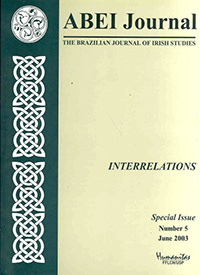Paper Knowledge. Books, Maps, Letters: the Written Word in Brian Friel’s Plays
DOI:
https://doi.org/10.37389/abei.v5i1.182586Resumo
Brian Friel’s plays often exploit the techniques of the short story writer, so that the presence of a character narrator, the use of extended monologues and direct address to the audience shed light on powerful acts of narration. The “narrative” strategy is recurring and often dominating, as in the case of Faith Healer, whose intergeneric or intermodal character is a challenge to dramatic action. However, the aural/oral dimension is counterbalanced by the presence of the written word on stage in the form of books, maps, letters, banners, newspapers, which remind the spectator/reader of the accomplishment of Friel’s plays as both literary and theatrical texts. The article investigates the use and the significance of the written word in Brian Friel’s oeuvre as a constant and obsessive presence. Books, maps, newspapers, letters, items that may seem negligible in isolation provide a recurring motif and turn out to be structurally relevant when pursued from play to play.
Referências
Andrews, Elmer. The Art of Brian Friel. London: Macmillan, 1995.
Corcoran, Neil. “The Penalties of Retrospect: Continuities in Brian Friel”, in Alan Peacock, (Ed.). The
Achievement of Brian Friel, Gerrards Cross: Colin Smythe, 1993, 14-28.
Dantanus, Ulf. Brian Friel. A Study. London: Faber and Faber, 1988.
Friel, Brian. “Extracts from a Sporadic Diary”, in Tim Pat Coogan (Ed.). Ireland and the Arts. Special
Issue of Literary Review. London: Quartet, n.d, 56-61.
_____. Selected Plays. Introduction by Seamus Deane. London: Faber and Faber, 1984.
_____. The Loves of Cass McGuire. Loghcrew: The Gallery Press, (1966), 1984.
_____. Lovers. Loghcrew: The Gallery Press (1968), 1984.
_____. The Communication Cord. Loughcrew: The Gallery Press, (1983), 1989.
_____. Making History. London: Faber and Faber, 1989.
_____. The Enemy Within. Loughcrew: The Gallery Press, (1972), 1992.
_____. The Gentle Island. Loughcrew: The Gallery Press, (1973), 1993.
_____. Wonderful Tennessee. Loughcrew: The Gallery Press, 1993.
_____. Plays Two. Introduction by Christopher Murray. London: Faber and Faber, 1999.
Funke, Lewis. “Interview with Brian Friel”, in Paul Delaney (Ed.). Brian Friel in Conversation. Ann
Arbor: The University of Michigan Press, 2000, 51-71.
Garratt, Robert F. “Beyond Field Day: Brian Friel’s Dancing at Lughnasa”, in Eberhard Bort (Ed.). The
State of the Play: Irish Theatre in the ‘Nineties. Trier, Wissenschaftlicher Verlag, 1996, 75-87.
Grene, NicholasThe Politics of Irish Drama. Plays in Context from Boucicault to Friel, Cambridge:
Cambridge University Press, 1999.
Hohenleitner, Kathleen “The Book at the Center of the Stage: Friel’s Making History and The Field Day
Anthology of Irish Writing”, in Stephen Watt; Eileen Morgan, Shakir Mustafa (Eds.). A Century of
Irish Drama. Widening the Stage. Bloomington and Indianapolis, Indiana University Press, 2000,
-55.
Hughes, Declan “Who the Hell Do We Think We Still Are? Reflections on Irish Theatre and Identity”, in
Eamonn Jordan (Ed.). Theatre Stuff. Critical Essays on Contemporary Irish Theatre. Dublin: Carysfort
Press, 2000, 8-15.
Jent, William “Immaterial Contingencies Relativizing the Rage for he Absolute in Brian Friel’s Wonderful
Tennessee”, in Canadian Journal of Irish Studies, v. 21, n. 1, July, 1995, 25-44.
Jones, Nesta Brian Friel. London: Faber and Faber, 2000.
Kiberd, Declan “Brian Friel’s Faith Healer”, in Masaru Sekine (Ed.). Irish Writers and Society at Large.
Gerrards Cross: Smythe, 1985, 106-21.
_____. Inventing Ireland, London: Vintage, 1996.
_____. “Theatre as Opera: The Gigli Concert”, in Eamonn Jordan (Ed.). Theatre Stuff. Critical Essays on
Contemporary Irish Theatre, Dublin: Carysfort Press, 2000, 145-58.
Kilroy, Thomas. “Theatrical Text and Literary Text”, in Alan Peacock (Ed.). The Achievement of Brian
Friel. Gerrards Cross: Colin Smythe, 1993, 91-102.
Mahony, Christina Hunt. Contemporary Irish Literature. Transforming Tradition. London: Macmillan,
Meissner, Colin. “Words Between Worlds: the Irish Language, the English Army, and the Violence of
translation in Brian Friel’s Translations”, in Colby Quarterly, v. XXVII, n. 3, Sept., 1992, 164-74.
O’Brien, George. Brian Friel. Dublin: Gill and Macmillan, 1989.
O’Hanlon, Redmond. “Brian Friel’s Dialogue with Euripides: Living Quarters”, in Eamonn Jordan
(Ed.). Theatre Stuff. Critical Essays on Contemporary Irish Theatre, Dublin: Carysfort Press,
, 107-121.
O’Toole, Fintan. “Marking Time: from Making History to Dancing at Lughnasa”, in Alan Peacock
(Ed.). The Achievement of Brian Friel. Gerrards Cross: Colin Smythe, 1993, 202-14.
Pine, Richard. The Diviner. The Art of Brian Friel. Dublin: University College Dublin Press, 1999.
Roche, Anthony. Contemporary Irish Drama from Beckett to McGuinness. Dublin: Gill and Macmillan,
Worth, Katherine. “Translations of History: Storytelling in Brian Friel’s Theatre”, in James Acheson
(Ed.). British and Irish Drama since 1960. London: Macmillan, 1993, 73-87.
Downloads
Publicado
Edição
Seção
Licença
Copyright (c) 2003 Giovanna Tallone

Este trabalho está licenciado sob uma licença Creative Commons Attribution-NonCommercial 4.0 International License.


